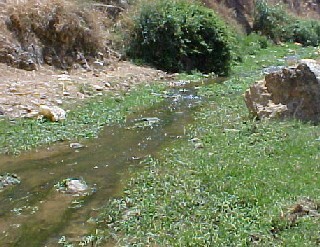Center for Economic and Social Rights 14 August 2003

Nablus stream polluted by Al-Hamra settlement (Photo: John Reese, July 2002)
One of these critical questions is the fulfillment of Palestinians’ right to water, recently reaffirmed by the UN Committee on Economic, Social and Cultural Rights as a fundamental human right. Average per capita consumption of water among Palestinians falls well below WHO standards of 100 litres per day and Israel monopolizes 85% of the water from the mountain aquifer which lies beneath the West Bank. Yet the “Road Map” makes only scant reference to water resources, leaving the issue to be resolved during an “international conference” at an unspecified date following Palestinian elections.
In spring of this year, CESR, in collaboration with local Palestinian NGOs, including the Palestinian Environmental NGO Network (PENGON) and the Palestinian Hydrology Group (PHG), conducted a project to document violations of Palestinians’ human right to water. From the construction of the wall of separation in the northern West Bank (separating whole towns and villages from their land and water), to the destruction of drinking water wells in Gaza, to Israel’s refusal to provide water services to unrecognized villages in the Negev, CESR found widespread and severe human rights violations.
CESR presented this information in a report to the UN Committee on ESCR, which after reviewing the findings, urged Israel to “take immediate steps to ensure equitable access to and distribution of water to all populations living in the occupied territories, and in particular to ensure that all parties concerned participate fully and equally in the process of water management, extraction and distribution.”
CESR believes that any lasting peace between Palestinians and Israelis must be built upon the basis of human rights, including the human right to water.
To download the full report (PDF) click here.
Related Links: